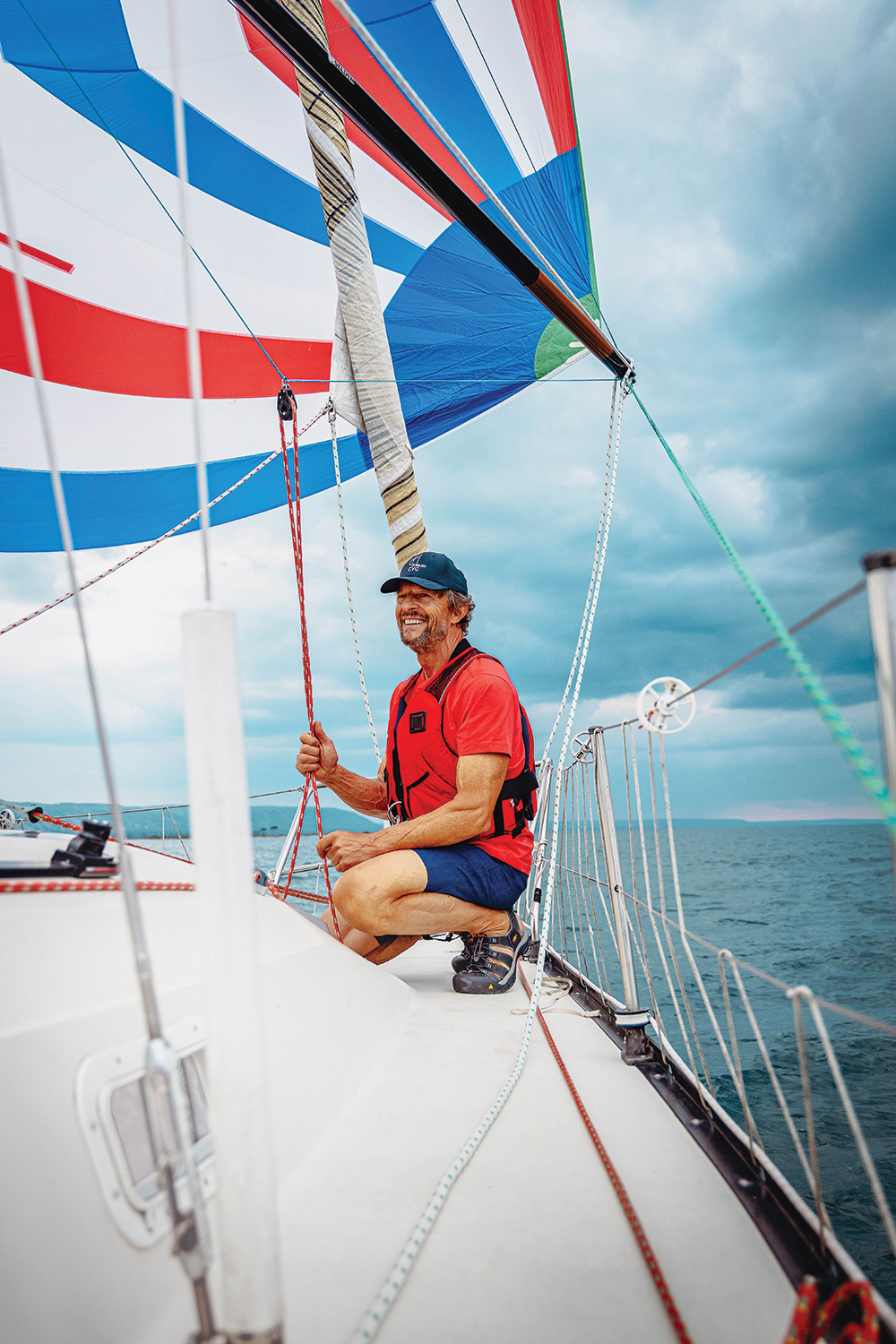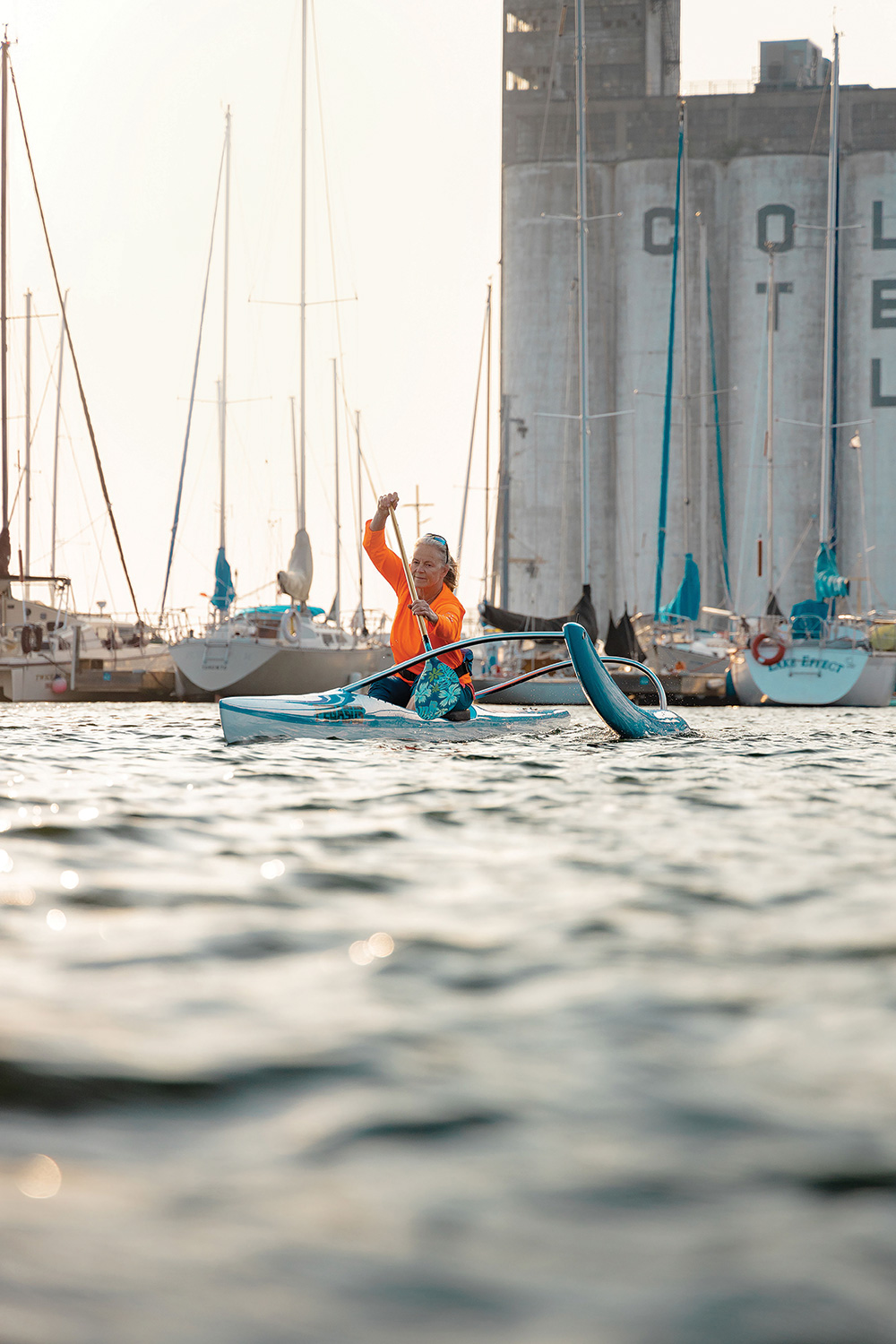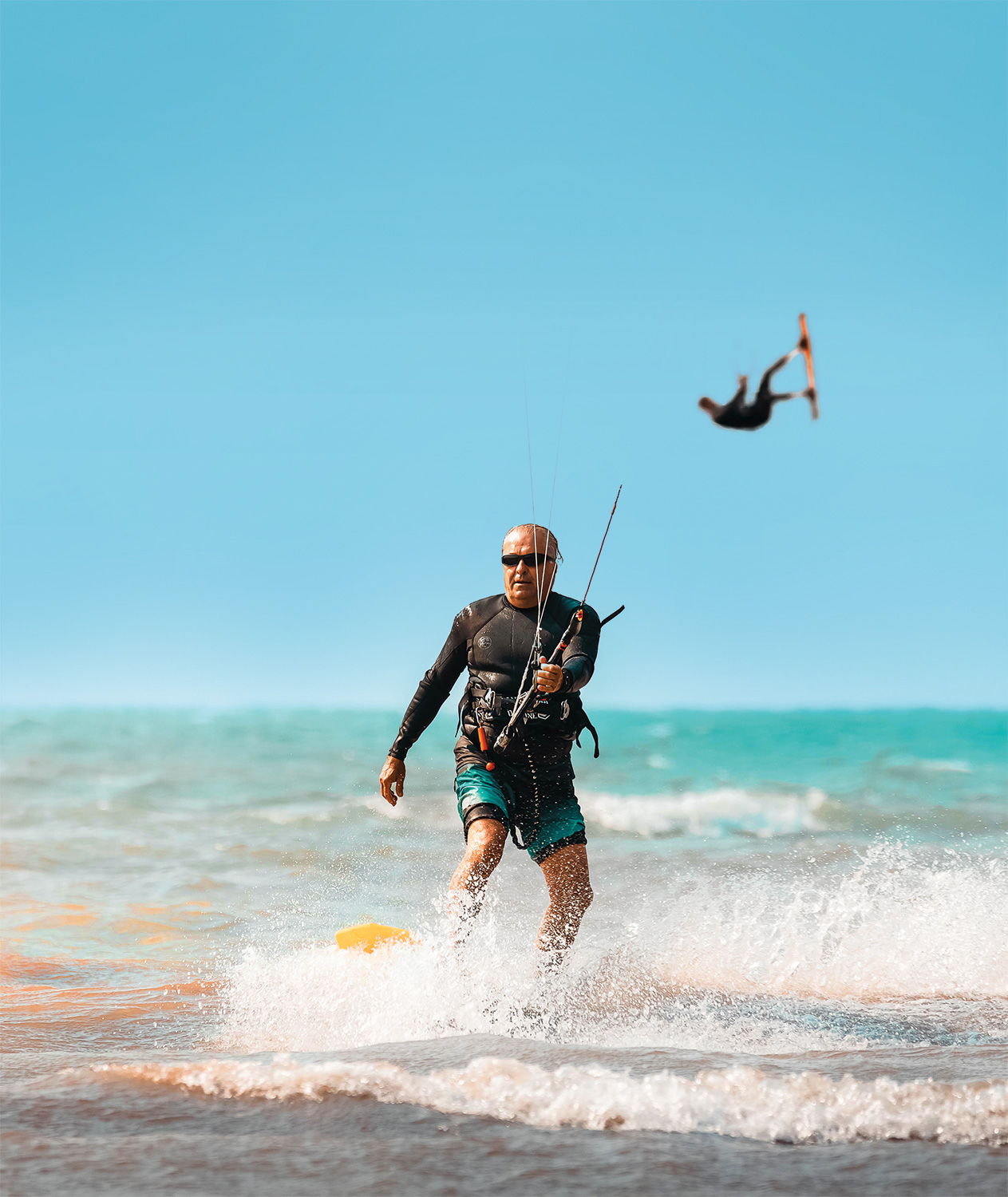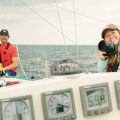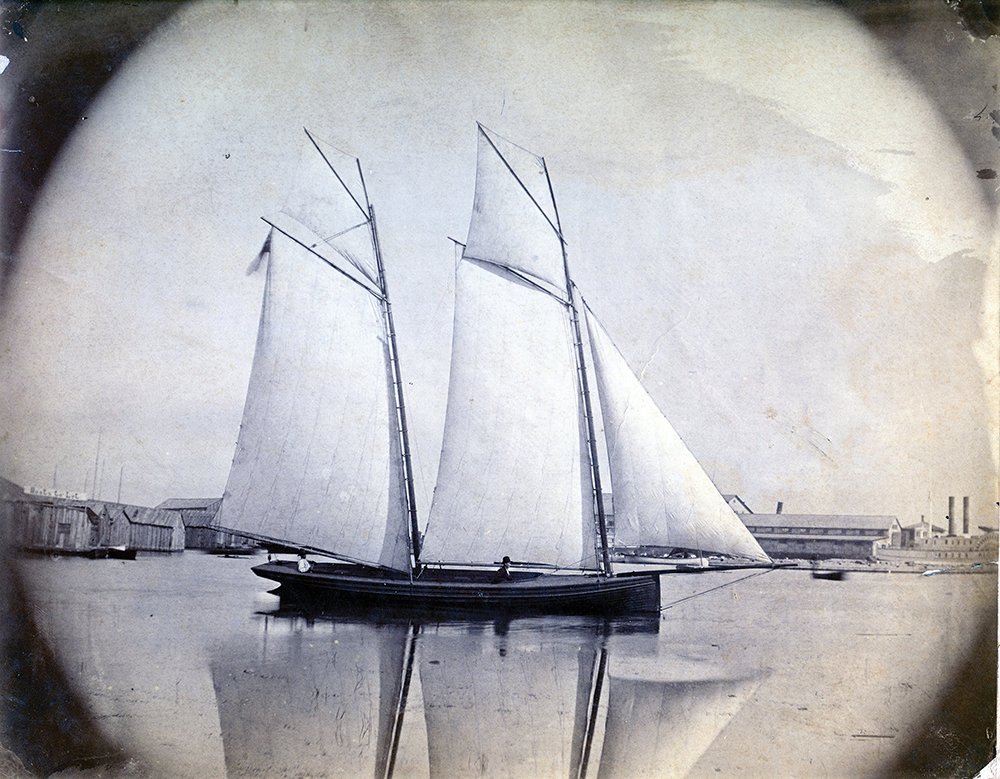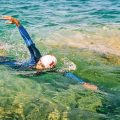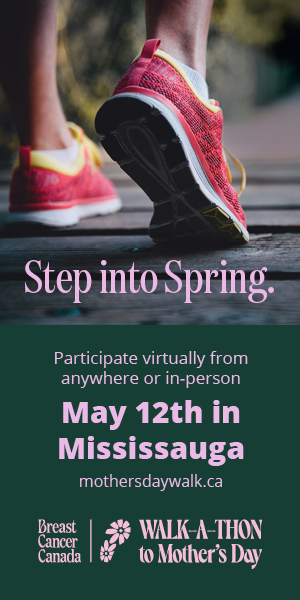It’s time to dive into fitness. These five “seasoned” watersports athletes’ stories will keep you young at heart.
By Dianne Rinehart // Photography by Jenna Kitchings
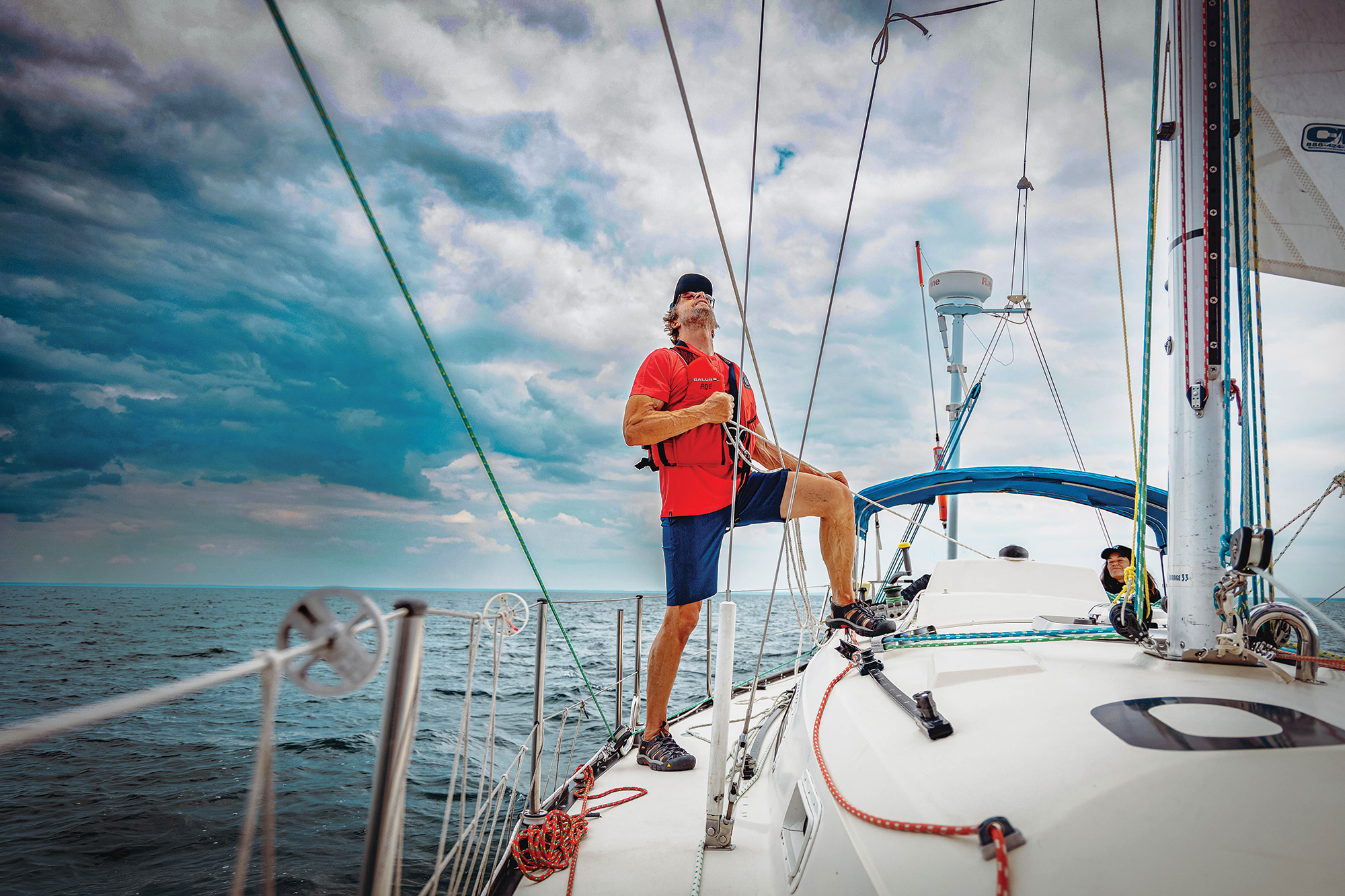
Adrian van den Hoven aboard the Ophir II.
Everyone knows the basics of staying fit. A well-rounded exercise routine should include moderate to vigorous-intensity pursuits such as walking, hiking and running, plus strength training and activities that improve balance, such as yoga.
This is especially important as you age. And what could be more fun in the summer than achieving all those fitness goals on, and in, the water? How?
Let these five “seasoned” athletes from around the Bay be your guide. From working out in teams in sculls and outrigger canoes, to simply feeling they are one with nature as they navigate boards, boats and their bodies through serene waters, these athletes will inspire you to get into the swim of things.
“More people have been in orbit or on top of Mount Everest than have sailed the Great Lakes single-handed.”
Adrian van den Hoven, 62
Retired hydro worker, solo sailor
Craigleith
Adrian van den Hoven is no loner. His life is rich with friends. And he has his dog, Panda, with whom he spends hours playing each day. But what van den Hoven most excels at, and loves, is solo sailing his 33-foot Mirage, Ophir ll, out of the Collingwood Yacht Club (CYC).
Van den Hoven didn’t grow up sailing. He first fell under its spell on a trip to the British Virgin Islands in 1989. When he returned to Collingwood—where he had moved from Mississauga so that he could go night skiing after his hydro job—he joined the CYC and began sailing on a 16-foot boat. When the Mirage came up for sale in ’91, he bought it and began cruising with his late wife, Kim Campbell.
By 2000, he had sailed his first solo race from Port Huron to Sarnia. After his wife died in 2005, van den Hoven began to enter more races. In 2006 he crewed on the Smokum Too, the first Canadian entry to win the Chicago Yacht Club Race to Mackinac on Lake Michigan.
By 2010, he was the first Canadian to solo sail all five Great Lakes. “More people have been in orbit or on top of Mount Everest than have sailed the Great Lakes single-handed,” he says.
How safe can it be to sail for three or more days straight? “The rule is you’re harnessed in from the time you leave dock to the time you land,” he says. But he admits he’s had “some scary moments.” One time at night in dense fog, he was almost T-boned by another boat. And “he’s come awfully close” to a few freighters at night or when he’s manoeuvring through straits.
Then, of course, there are the storms. In 1995 he and a friend survived a squall line that took out century-old trees on land. They heard mayday calls from other sailors over the radio. But these are also the times van den Hoven loves the most: watching flashing storms on the horizon as he sails solo at night. “I’m on my boat, on my terms.”
More the wonder that van den Hoven finds time to do any other sports! Yet in the winter he takes Panda skijoring twice daily, for two hours at a time. The combination of cross-country skiing and dog sledding provides an amazing workout for them both. He also lifts weights, and used to be 30 pounds heavier than his current, built-for-speed 192.
“I was ripped,” he laughs, recalling those days when one of his training partners was Doug Chessell, who was drafted by the Chicago Blackhawks. Now he’s leaner and yoga has taken priority, though he still lifts weights.
As if that isn’t healthy enough, van den Hoven, who grew up working on the family dairy farm, has a new passion: “I’m taking a foraging course,” he says. “You forage for anything you can eat: mushrooms, dandelions, nettles for tea.” And of course, if you’re on your sailboat, you catch fish.
Anne Baker, 61
Freelance Pilates and fitness instructor, outrigger canoe paddler
Collingwood
It’s not too often you see a person paddling an outrigger canoe around Georgian Bay. There are a few of the super-sleek boats around, though. And one of their most fervent admirers is Anne Baker.
The Collingwood resident used to race competitively in a dragon boat from 2004 to 2011, but when she retired, she reevaluated what she wanted to do on the water and chose outrigger canoeing as “her activity.”
She says it’s hard to define the feeling she gets from paddling around the Bay from the Collingwood Paddling Club. But it takes her so far outside of the grind of life that she often forgets she’s sitting in a skinny piece of carbon fibre in the middle of the Bay.
“It’s meditative,” she says. “There’s a sense of flow. You don’t even think about it. It’s being connected with the water and the boat.” And since outriggers can seat one to six people, depending on the size, you can paddle with pals—or your husband, as Baker does. “We call it our marriage counsellor,” Baker laughs. “You have to work together.”
The pilates and fitness instructor also loves the outrigger because it utilizes all her favourite sports. “There are elements of yoga and Pilates and weightlifting,” she says. “It all aligns.”
Nor is paddling just for the young. “I’m coaching women online that are 76,” she says. And it’s a sport she can take with her around the world. “I’ve paddled in Hawaii in a big ocean with people,” she says of countries where the culture is to paddle in outriggers. Paddling, she says, is spiritual for those people, and anyone who does it.
“There’s an understanding that everyone is welcome, that you need to take care of the water and the creatures in it,” she says. “It’s the spirit of ohana. No one gets left behind.”
Matt Bartol, 60
Owner, Blue Surf Paddle Boards and Kayaks,
Surf & Turf Blue Mountains
The Blue Mountains
Matt Bartol got into kitesurfing, or kiteboarding as it’s also known, 25 years ago in Cabarete, in the Dominican Republic, when the sport was in its infancy. He remembers before safety features were developed, people were getting dragged onto land and killed. Yet, he persisted.
Now, kiteboarding is on the cusp of being in the Olympics, beginning with the 2024 games in Paris. And major innovations, like the addition of hydrofoils, which lift the boards up over the waves, are driving a rapid evolution in the sport.
Still, for Bartol, it was never “a racing thing.” Kiteboarding is about oneness with nature, he says, recalling how he once filmed manatees swimming alongside his board. “With wind sports you are alone with nature. It’s quiet and peaceful. You’re in tune with nature,” he says. “You need to be in balance with nature to do wind sports.”
Not that nature is always kind. Bartol has broken his ribs twice, “Just from the impact of hitting the water.” But he insists the sport is “not physically challenging.” The upward lift of the kite makes the acrobatics involved in the sport—the flips, the jumps—easier, he says.
“It’s a finesse sport rather than a power sport. I’ve had customers (at Blue Surf) who started at 65 and were successful.”
Bartol has even boarded over snow-laden farm fields in the winter. “It’s an opportunity to do things against gravity.”
“I’ve always worked out in nature,” says the multisport athlete who once raised Arabian horses. (His wife, Kristine Bayles, is a former member of Canada’s modern pentathlon team—equestrian, swimming, shooting, running and fencing.) “Then I bought a mountain bike and a snowboard—and that led to kiteboarding.”
What he got into mostly was a lifestyle. He had been in construction and then real estate. “But I wanted something I was passionate about,” he says. “My passion was for watersports.”
He turned that passion into a business, opening Blue Surf, the shop where he sells kiteboards, paddleboards and kayaks. Initially, he also taught the sport. More recently he has also opened Surf & Turf Blue Mountain—“high end steaks and groceries,” he laughs from his backyard deck, which overlooks Georgian Bay where he can hit the water at a moment’s notice. Perfect.
Dennis Yurkiw, 70
Chiropractor, rower
Owen Sound
Dennis Yurkiw, a chiropractor, athlete and musician, never does anything “ass backwards,” except when it comes to his favourite sport.
“When you’re rowing, your bum crosses the finish line before you do,” he explains.
Yurkiw, the father of former Olympic skier Larisa Yurkiw, has been rowing for 22 years at 5 a.m. on summer mornings at the Owen Sound Rowing Club—ever since he picked up a boat, or scull, from a rowing club in Sudbury.
His inspiration? An 80-plus-year-old woman who was coming in off the water at 8:30 a.m. after her row. Now he’s the one inspiring his friends. “The guys I golf with are 52 and 54,” he says. They tease him for his age. “But I out-drive them!” he laughs. “And when I buy golf shirts, they’re the slim-fit ones.”
Rowing is such an effective workout that Yurkiw says he loses two inches off his waist every spring, even though he skis hard all winter—taking tons of turns to get a good workout—every weekend at Georgian Peaks.
During COVID, when the rowing club shut down, he bought a rowing machine and set it up in his basement beside the furnace.
What he loves about rowing is that it is “easy on the body.” And calming. “You get in the boat with people who are the same fitness level, temperament and mindset,” he says. “Then you row at your own pace and comfort for 20 minutes, row the hardest you can for 10, then cruise for 10. It’s exhausting, but it burns a lot of fat, and gives you strength and fitness.”
Yurkiw also loves the rowing culture. Rowers are busy people, out on the water at 5 a.m., eating breakfast at 6, and home in the shower by 7 to get ready for work. And he loves travelling through Owen Sound in the mornings when it is quiet, and rowing on the water in its morning state of calmness.
But rowing and skiing are not Yurkiw’s only loves. He also cycles. He and his wife Lynda recently cycled through France covering 50 to 80 kilometres a day.
He also plays pickleball—oh, and loves the “sport” of gardening, Lynda reminds him.
He learned to ice skate at age 47, and then to play hockey. He found a bunch of other athletic guys who were also embarrassed that they didn’t know how to play Canada’s national winter sport. Then he rented a barn with a skating rink and hired a power skating expert to train them. “We called ourselves the “Makebeliefs,” he laughs.
Recently, on a vacation to Antigua, he took up scuba diving. The most ironic thing? Yurkiw never played sports as a kid. He grew up in a poor neighbourhood in the north end of Winnipeg, working his way through school with part-time jobs in the restaurant business.
In other words, he’s making up for lost time, and—quelle surprise!—he has no plans to stop.
Denyse Krizmanich, 61
Retired teacher, open water swimmer
The Blue Mountains
When Denyse Krizmanich moved up to The Blue Mountains she worried about leaving her Mississauga community and teaching job behind. But she needn’t have. What she found here was a sense of community and spirit among a group of people in the Georgian Bay Squall Masters Swimming club, which operates out of the Centennial Aquatic Centre in Collingwood.
“I’m so glad we made this move,” she says of a lifestyle centred around swimming in the pool, as well as in the Bay in Collingwood and at her cottage near Parry Sound. “I love swimming,” she says. “I’m a really busy person, but when I get into the water I get into that peaceful mode.”
While she grew up around the pool and started racing when she was six or seven, not everyone in “the Squall” has. “It’s a diverse group,” she says. There are people training for an Ironman, and “young people in their twenties and thirties and one lady who just turned 80. There’s a wide variety of ages and abilities. People just want to get into the pool and swim.”
Krizmanich swims three mornings a week in the pool, and she plans to enter a three-kilometre open-water swim in Collingwood on July 9.
And when she’s out of the water, she’s always on the go. “We’re a pretty active family,” she says, understatedly. She and her husband cycle the roads, downhill and cross-country ski, play pickleball, kayak, paddleboard and do yoga. “This area really suits our lifestyle,” she laughs. “The skiing is here, the cycling is here, the Bay is here.”
And being part of the swim club has led to other activities with people she has met there. “I cycled with women in their thirties this morning,” she says. “I like connecting with people in the community.”
That was especially important three years ago, during COVID lockdowns, when Krizmanich first arrived. She had been involved in so many groups and community activities in Mississauga, then she moved up here, she explains. “It was a new neighbourhood—and COVID.”
Now she connects through the swim club with women on other issues, such as The Purse Project Network, a group of women who donate purses filled with personal care items and toiletries to women’s shelters, such as The Women’s Centre Grey Bruce. And she has joined 100 Women Who Care South Georgian Triangle, who all donate $100 each to a cause quarterly.
Swimming has led to what Krizmanich calls “across the board community connections.” You might say the Squall Masters helped her dive not only into the pool, but into the community.






